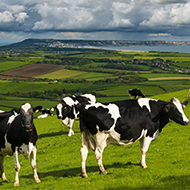
Defra has identified further cases of the virus in Dorset.
A restriction on the movement of cattle has been extended to Dorset following the identification of bluetongue (BTV-3) disease.
The confirmation of cases by the APHA and DEFRA brings the total number of of BTV-3 cases in Great Britain for the 2024/25 vector season to 212.
A spokesperson for the APHA said: “Following the identification of cases in cattle in Dorset as part of the winter surveillance and in accordance with our policy of seeking to contain and slow the spread of disease by preventing the long distance moves of high-risk infected animals, the restricted zone was further extended on 14 February 2025 to include: Dorset, Additional areas of Wiltshire, Somerset (part), East Devon (part).”
The UK’s chief veterinary officer (CVO) Christine Middlemiss recently stated the UK was currently ‘a seasonally low vector period’ for bluetongue virus, but urged farmers to remain vigilant for the disease.
She added: “We are committed to working with everyone affected and will continue to keep the Restricted Zone under review.”
Bluetongue virus is a notifiable disease that should be reported to the APHA on 03000 200 301
Image (C) Shutterstock.



 The RCVS has announced a new version of its 1CPD mobile app, with enhanced features for veterinary surgeons and veterinary nurses to record their continuing professional development.
The RCVS has announced a new version of its 1CPD mobile app, with enhanced features for veterinary surgeons and veterinary nurses to record their continuing professional development.